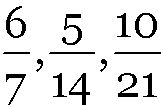HCF and LCM Worksheet-4
Mark against the correct answer:
-
Let N be the greatest number that will divide 1305, 4665 and 6905, leaving the same remainder in each case. Then sum of the digits in N is :
(a) 4 (b) 5 (c) 6 (d) 8
-
The greatest number which can divide 1356, 1868 and 2764 leaving the same remainder 12 in each case, is :
(a) 64 (b) 124 (c) 156 (d) 260
-
The greatest number which on dividing 1657 and 2037 leaves remainders 6 and 5 respectively, is :
(a) 123 (b) 127 (c) 235 (d) 305
-
Which of the following fractions is the largest ?
(a)  (b)
(b)  (c)
(c)  (d)
(d) 
-
What will be the least number which when doubled will be exactly divisible by 12, 18, 21 and 30 ?
(a) 196 (b) 630 (c) 1260 (d) 2520
-
The smallest fraction, which each of
 will divide exactly, is :
will divide exactly, is :
(a)  (b)
(b)  (c)
(c)  (d)
(d) 
-
The least number of five digits which is exactly divisible by 12, 15 and 18, is :
(a) 10010 (b) 10015 (c) 10020 (d) 10080
-
The greatest number of four digits which is divisible by 15, 25, 40 and 75 is :
(a) 9000 (b) 9400 (c) 9600 (d) 9800
-
The least number which should be added to 2497 so that the sum is exactly divisible by 5, 6, 4 and 3 is :
(a) 3 (b) 13 (c) 23 (d) 33
-
The least number which is a perfect square and is divisible by each of the numbers 16, 20 and 24, is :
(a) 1600 (b) 3600 (c) 6400 (d) 14400
-
The smallest number which when diminished by 7, is divisible by 12, 16, 18, 21 and 28 is
(a) 1008 (b) 1015 (c) 1022 (d) 1032
-
The least number which when increased by 5 is divisible by each one of 24, 32, 36 and 54, is :
(a) 427 (b) 859 (c) 869 (d) 4320
-
The least number, which when divided by 12, 15, 20 and 54 leaves in each case a remainder of 8, is :
(a) 504 (b) 536 (c) 544 (d) 548
-
The largest four-digit number which when divided by 4, 7 or 13 leaves a remainder of 3 in each case, is :
(a) 8739 (b) 9831 (c) 9834 (d) 9893
-
Let the least number of six digits, which when divided by 4, 6, 10 and 15, leaves in each case the same remainder of 2, be N. The sum of the digits in N is :
(a) 3 (b) 4 (c) 5 (d) 6
-
The least multiple of 7, which leaves a remainder of 4, when divided by 6, 9, 15 and 18 is:
(a) 74 (b) 94 (c) 184 (d) 364
-
The least number, which when divided by 48, 60, 72, 108 and 140 leaves 38, 50, 62, 98 and 130 as remainders respectively, is :
(a) 11115 (b) 15110 (c) 15120 (d) 15210
-
Find the least multiple of 23, which when divided by 18, 21 and 24 leaves remainders 7, 10 and 13 respectively.
(a) 3002 (b) 3013 (c) 3024 (d) 3036
-
The least number which when divided by 5, 6, 7 and 8 leaves a remainder 3, but when divided by 9 leaves no remainder, is :
(a) 1677 (b) 1683 (c) 2523 (d) 3363
-
Find the least number which when divided by 16, 18, 20 and 25 leaves 4 as remainder in each case, but when divided by 7 leaves no remainder.
(a) 17004 (b) 18000 (c) 18002 (d) 18004
-
Six bells commence tolling together and toll at intervals of 2, 4, 6, 8, 10 and 12 seconds respectively. In 30 minutes, how many times do they toll together ?
(a) 4 (b) 10 (c) 15 (d) 16
Answer Key:
(1)-(a); (2)-(a); (3)-(b); (4)-(a); (5)-(b); (6)-(a); (7)-(d); (8)-(c); (9)-(c); (10)-(b); (11)-(b); (12)-(b); (13)-(d); (14)-(b); (15)-(c); (16)-(d); (17)-(b); (18)-(b); (19)-(b); (20)-(d); (21)-(d)
 (b)
(b)  (c)
(c)  (d)
(d) 
 will divide exactly, is :
will divide exactly, is : (b)
(b)  (c)
(c)  (d)
(d) 